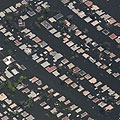Wednesday, June 28, 2023
Not Found
The requested URL /collections/issues/include_collection_navigation.shtml was not found on this server.
Coverage from Minnesota Public Radio
Communities in the Gulf Coast region are still struggling to recover from the devastation of Hurrican Katrina. MPR's Jon Gordon is in Jackson, Mississippi, helping a public radio station in that area cover the story. Gordon talked with Morning Edition host Cathy Wurzer about what he's been seeing.
(09/28/2005)
A week after Hurricane Katrina hit, the Federal Emergency Management Agency asked Minneapolis-based refugee expert Hugh Parmer for advice on what to do with all the people the storm had displaced. Parmer, president of the American Refugee Committee, talked about the Federal response to Katrina and his brief stint as a senior advisor to FEMA on Friday at the University of Minnesota.
( 09/26/2005)
This hurricane season brings severe destruction and lessons for disaster preparedness. In the first half of the show, we examine global warming's contribution to hurricane activity. In the second half of the program, we'll discuss the logistics of evacuations.
( 09/26/2005)
A list of resources for assisting hurricane victims.
(09/23/2005)
More than 90 health care workers from the University of Minnesota, the Mayo Clinic, and the College of St. Catherine have spread out through rural Louisiana to deliver medical care to people affected by Hurricane Katrina. With Hurricane Rita now expected to hit the region, the Minnesota group is being evacuated to a northern part of Louisiana. The U of M's Dr. Jon Hallberg is with that group, and he talked with MPR's Greta Cunningham.
(09/22/2005)
There's no consensus among Minnesota's congressional delegation on how to pay for the recovery.
(09/22/2005)
The Federal Reserve continued its slow, steady increase of interest rates Tuesday, saying that it thinks Hurricane Katrina's economic impact will be short-lived. Will it?
( 09/21/2005)
Private donations to aid the victims of Hurricane Katrina now exceed $1 billion. But not all disasters bring in such big money. How do people decide which causes should receive their financial support?
( 09/20/2005)
Meteorologists have their eyes on Rita, yet another tropical storm in one of the most active and destructive hurricane seasons on record. The National Weather Service is one federal agency garnering praise for forecasting the path of Katrina and the potential for devastation.
( 09/20/2005)
Hurricane Katrina has inspired a nationwide outpouring of sympathy, grief and outrage. We watched the institutions of society crumble before our eyes on television, bringing out the best in some and the worst in others. What did the storm teach us about the human condition?
( 09/19/2005)
President Bush has pledged to rebuild the area of the Gulf Coast devastated by Hurricane Katrina. But many say meaningful long-term recovery will only happen if the country addresses the region's poverty in the process.
( 09/19/2005)
An 80-member team of Minnesota medical personnel are in Louisiana to help treat victims of Hurricane Katrina. The team includes staff from the Mayo Clinic, the University of Minnesota, and the College of St. Catherine. The effort is called "Operation Minnesota Lifeline." The U of M's Dr. Jon Hallberg is one of them, and he talked with MPR's Phil Picardi from Louisiana.
(09/16/2005)
The Minnesota Orchestra opens its new season this weekend. It's a special concert series for one musician in particular, double bass player David Anderson, who is a member of the Louisiana Philharmonic in New Orleans. When Hurricane Katrina hit, Anderson was out of town. Now he's found a temporary home in Minnesota.
(09/16/2005)
President Bush promised "one of the largest reconstruction efforts the world has ever seen" to rebuild the hurricane-ravaged Gulf Coast in a speech Thursday night from New Orleans. Nearly three weeks after Katrina hit, what does the situation look like on the ground?
( 09/16/2005)
People who lost their homes in Hurricane Katrina are now scattered across the country, many of them in evacuee camps. Since the start of the disaster, there's been some discussion about whether to describe those people as refugees. Local actor and singer T. Mychael Rambo argues the term "refugee" has negative connotations and racial overtones. Several listeners called MPR with their comments about the subject.
(09/12/2005)
Not Found
The requested URL /standard/include/mpr005/global_module_shortcuts.shtml was not found on this server.
Services
- HD Radio
- newiPhone app / Mobile
- E-mail newsletters
- RSS feeds
- Podcasts
- Submit your photos
- Videos
- Weather
- Most e-mailed stories
Tools
Not Found
The requested URL /standard/include/mpr005/global_ad_middle.shtml was not found on this server.






